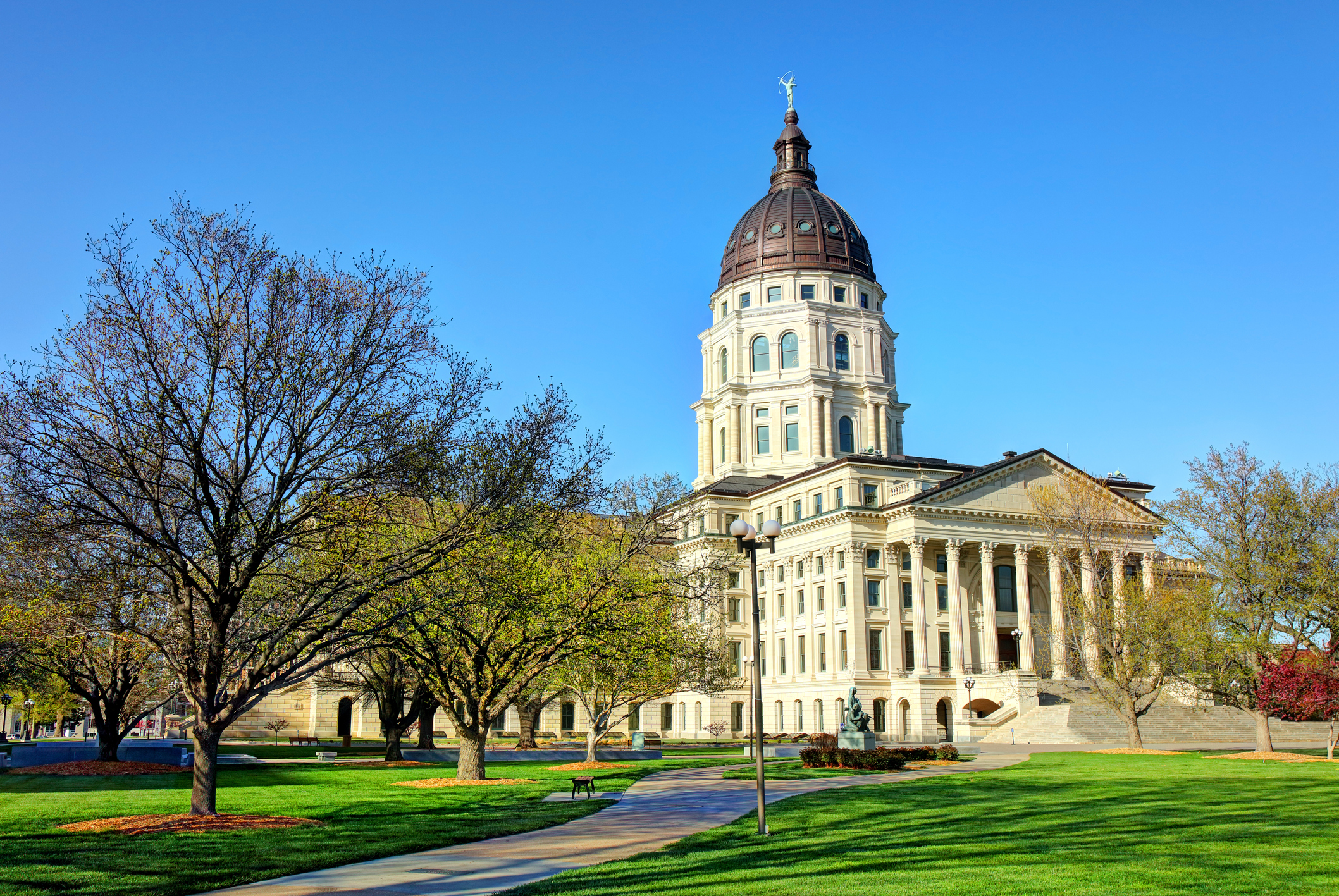2022 Kansas Labor & Employment Year End Review

Wichita, Kan. (January 23, 2023) – The 2022 legislative session for the State of Kansas began in January 2022. The legislators were back in the Capitol for the first time since the COVID-19 pandemic and ready to work. Notably, several bills that focused on the authority of state and local governmental authorities when responding to contagious or infectious diseases such as COVID-19 died on general orders or were sustained through Governor Laura Kelly’s veto. For example, Senate Substitute for House Bill No. 2062 would have prohibited long-term care facilities and healthcare facilities managed by state or local government from restricting residents’ or patients’ right to receive or refuse visitors in their private rooms.
However, other bills survived and passed that impacted the sphere of labor and employment, including retirement and health benefits for certain industries and the rights of practice for certain healthcare professionals. The following list below provides a summation of pertinent labor and employment related bills of 2022 that did pass into law.
Healthcare and Retirement Related
HB No. 2110
This bill was signed by Governor Laura Kelly on April 7, 2022 and requires the State Employee Health Plan (SEHP) for the plan year 2023 to provide coverage for the diagnosis and prescribed treatment for pediatric acute onset neuropsychiatric syndrome (PANS) and pediatric autoimmune neuropsychiatric disorders associated with streptococcal infectious (PANDAS) for the purpose of studying the utilization and cost of such coverage.
HB No. 2481
This bill was signed by Governor Laura Kelly on April 7, 2022. It relates to the Kansas police and firemen’s retirement system. The bill authorizes the purchase of participating service credit for certain in-state non-federal governmental employment and governs the method of payments. Effective July 1, 2022, any member of the Kansas police and firemen's retirement system who was previously employed through in-state nonfederal governmental employment and whose service otherwise meets the requirements of an employee as prescribed in K.S.A. 74-4952(4) and amendments thereto, and meets the requirements of K.S.A. 74-4902(10) and amendments thereto, may elect to purchase service for such nonfederal governmental employment.
Senate Substitute for HB No. 2279
This bill was signed by Governor Laura Kelly on April 15, 2022, amending the Kansas Nurse Practice Act (KNPA), which governs the licensure of advance practice registered nurses. Significantly, this bill allows advance practice registered nurses to prescribe drugs without a written protocol as authorized by a responsible physician. It also requires them to maintain malpractice insurance and requires national certification for initial licensure as an advanced practice registered nurse.
SB No. 453
Governor Laura Kelly signed this bill on April 18, 2022. It amends the law and clarifies that the 40 hours of training for unlicensed employees working in an adult care home are part of an approved certified nurse aide (CNA) training course required by the Secretary of the Kansas Department for Aging and Disability Services (KDADS). The bill specifies who may prepare, administer, and teach the first 40 hours and remaining hours of CNA training, where the training may be conducted, the timeframe for completion of the training, and who may evaluate the skills demonstration to confirm successful completion of the training course. The bill prohibits any unlicensed employees who are not making progress toward completion of the CNA training required by the Secretary within four months following completion of the first 40 hours of CNA training from providing direct, individual care to residents. The bill also expands the entities authorized to prepare and administer the training to include a hospital, hospice, Program of All-Inclusive Care for the Elderly (PACE), or qualified course sponsor. It also expands the premises at which the training could be conducted to include a hospital, hospice, or PACE.
SB No. 421
This bill concerns the Kansas Public Employees Retirement System. It authorizes certain transfers from the state general fund to the Kansas public employees’ retirement fund. It also limits the rate of contribution certified to the State of Kansas and the participating employers, as defined by K.S.A 74-4931 (which include Kansas public school districts, technical colleges, community junior colleges, or state agencies having employees who are members of the state school retirement system), of the additional percentage contribution corresponding to the level dollar repayment amount. In 2022, the employer contribution rate is 13.11%, and in each subsequent calendar year, the rate of contribution for an employer will be an amount not to exceed more than 1.2% of the amount of the immediately preceding fiscal year.
Business Related
House Substitute for SB No. 91
This bill was signed by Governor Laura Kelly on April 13, 2022. It provides liability protection for businesses that participate in work-based learning programs; providing in part, that a business that accepts a secondary student in a work-based learning program shall not be subject to civil liability for any claims arising from the student’s negligent act or omission during the students participation in the work-based learning program at the business or work site, nor shall a business that accepts a secondary student in a work-based learning program be subject to civil liability for any claim for bodily harm to the student or sickness or death by accident of the student arising from the business’ negligent act or omission during the students participants.
Employment Related
HB No. 2703
This bill creates the Kansas Targeted Employment Act, which establishes a tax credit for businesses that employ individuals who are Kansas residents with developmental disabilities, and amends laws related to unemployment compensation regarding out-of-state reimbursing of employers, fund control tables, solvency and credit rate schedules, and the My Reemployment Plan program. The Act also makes the program mandatory instead of voluntary.
Case Law Relating to Civil Service Employment
On August 5, 2022, the Supreme Court of Kansas opined in Bruce v. Kelly, 514 P.3d 1007, two questions of law certified by the United States Court for the District of Kansas. This proceeding was unique because the lawsuit was not pending before any Kansas state court and was posed to the Supreme Court of Kansas in part because of the lack of controlling Kansas precedent interpreting the relevant provision. The two questions before the Supreme Court of Kansas were as follows:
- Does Kan. Stat. Ann. §74-2113 define the rank Major in the Kansas Highway Patrol (KHP) as a member of the unclassified or classified service of the Kansas Civil Service?
- If Kan. Stat. Ann. §74-2113 defines the rank of Major in the KHP as a member of the classified service, does Kan. Admin Regs. §1-7-4 require a former member of the classified service – who already has completed a required probationary period for the classified service – to serve another six-month probationary period in the classified service after serving as a member of the unclassified service?
Those two certified questions arose from a federal lawsuit that Mark A. Bruce filed against Governor Laura Kelly, Will Lawrence, and Kansas Highway Patrol Superintendent Herman T. Jones (collectively, the defendants). Bruce worked for the KHP for 30 years and was promoted to the rank of Major in 2008 and successfully completed a six-month probationary period in that role. After being appointed to serve as a Superintendent of KHP by the then-Governor of Kansas in 2015, he alleges the defendants forced him to resign his employment. Bruce argues that Kan. Stat. Ann. §74-2113 required the defendants to return him to the rank he held before his appointment to Superintendent, a return to the rank of Major with permanent status in the classified service, rather than terminate his employment. The defendants however contended that Bruce had no right to continued employment because Kan. Stat. Ann. §74-2113 places Major within the unclassified service, and employees in unclassified service have no right to continued employment. Additionally, the defendants argued that even if Kan. Stat. Ann. §74-2113 defines the rank of Major within the classified service, Kan. Admin Regs. §1-7-4 would have required Bruce to serve another probationary period upon his return to the rank of Major, during which his employment could have been terminated at will.
In its answer to the two questions posed, the Supreme Court of Kansas held that Kan. Stat. Ann. §74-2113 does define the rank of KHP Major as within the classified service and if KHP employees attain permanent status in the classified service before being appointed as Superintendent or Assistant Superintendent in the unclassified service, then Kan. Admin Regs. §1-7-4 (2021 Supp.) does not require them to service another probationary period when “returned” to their former rank and classification under Kan. Stat. Ann. §74-2113(a).
The practical implications of this ruling for employers are to heed caution to its civil service classifications and the implications of the protection of classified employees from termination. Further, once a probationary period is served and an employee returns to a former classified status under the applicable law, that employee need not serve an additional probationary period and maintains its protected status.
For more information on these developments, contact the author of this alert. Visit our Labor & Employment Practice page for additional alerts in this area.
Author:
Alan L. Rupe, Managing Partner - Kansas City, MO & Wichita, KS
Related Practices
- Labor & Employment
- Executive Compensation & Employee Benefits
- Employment Advice & Counseling
- Traditional Labor
